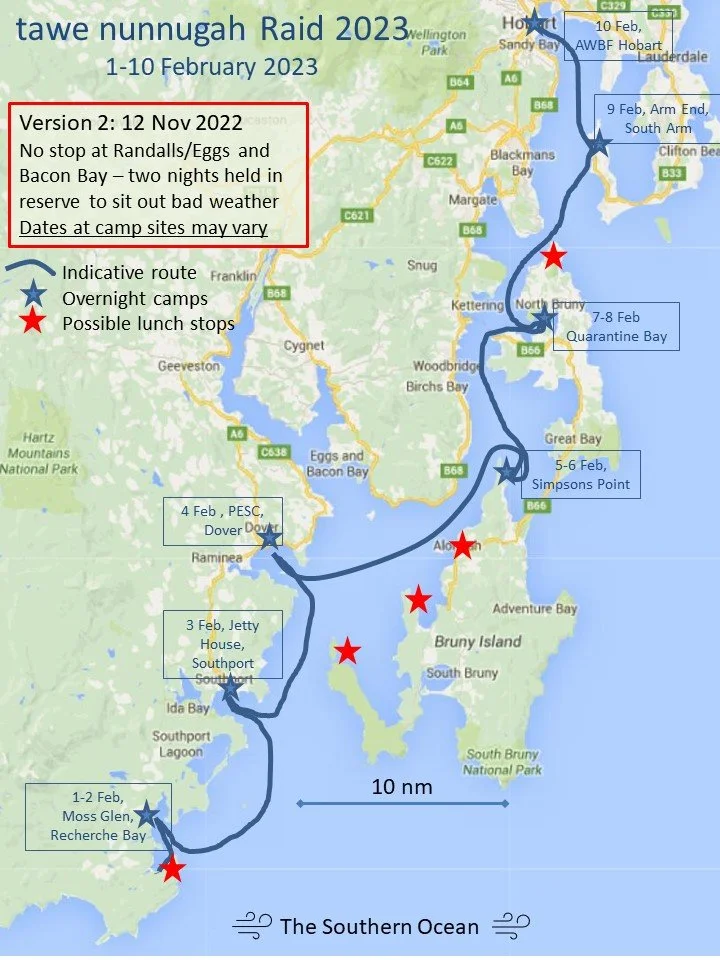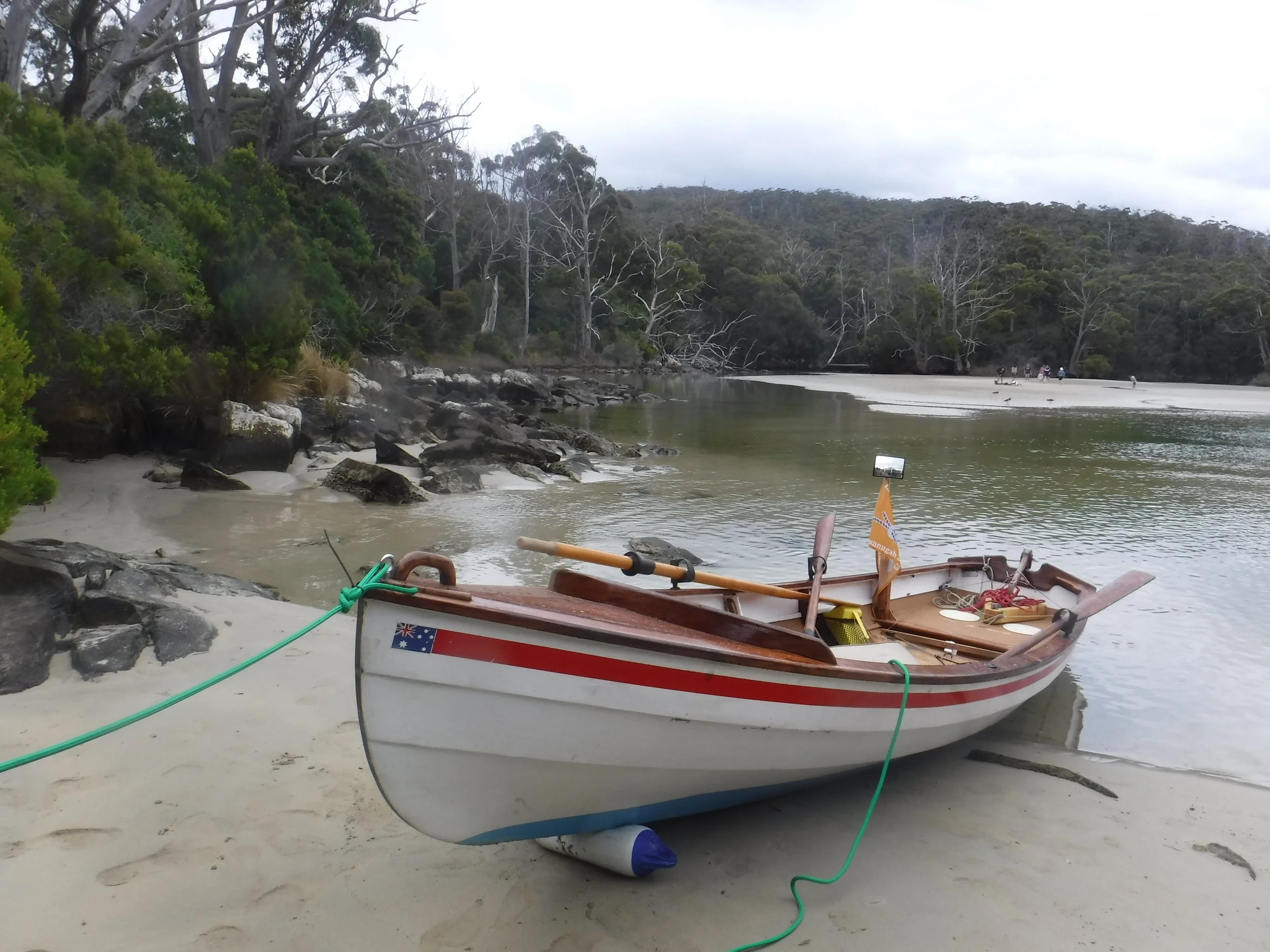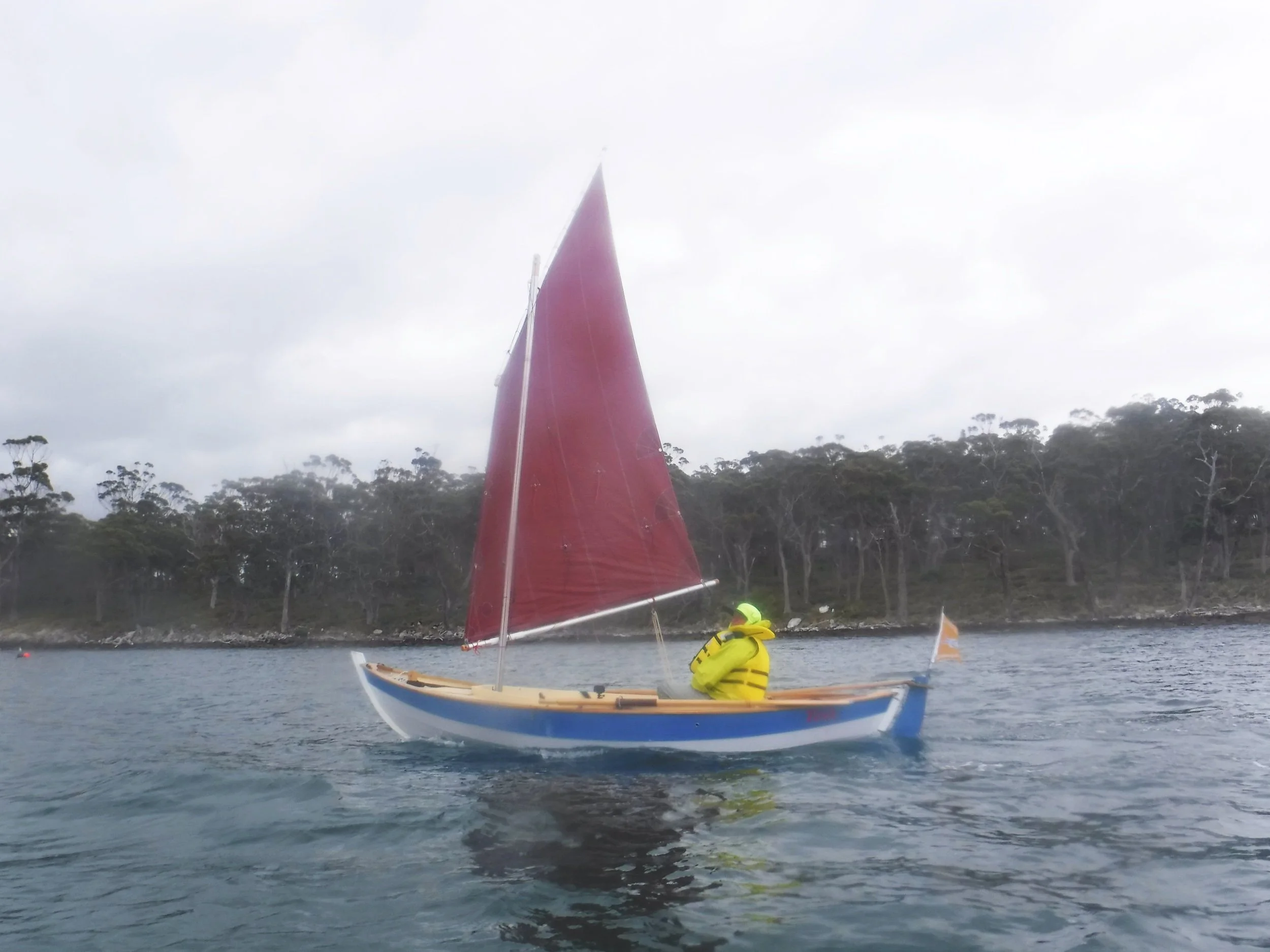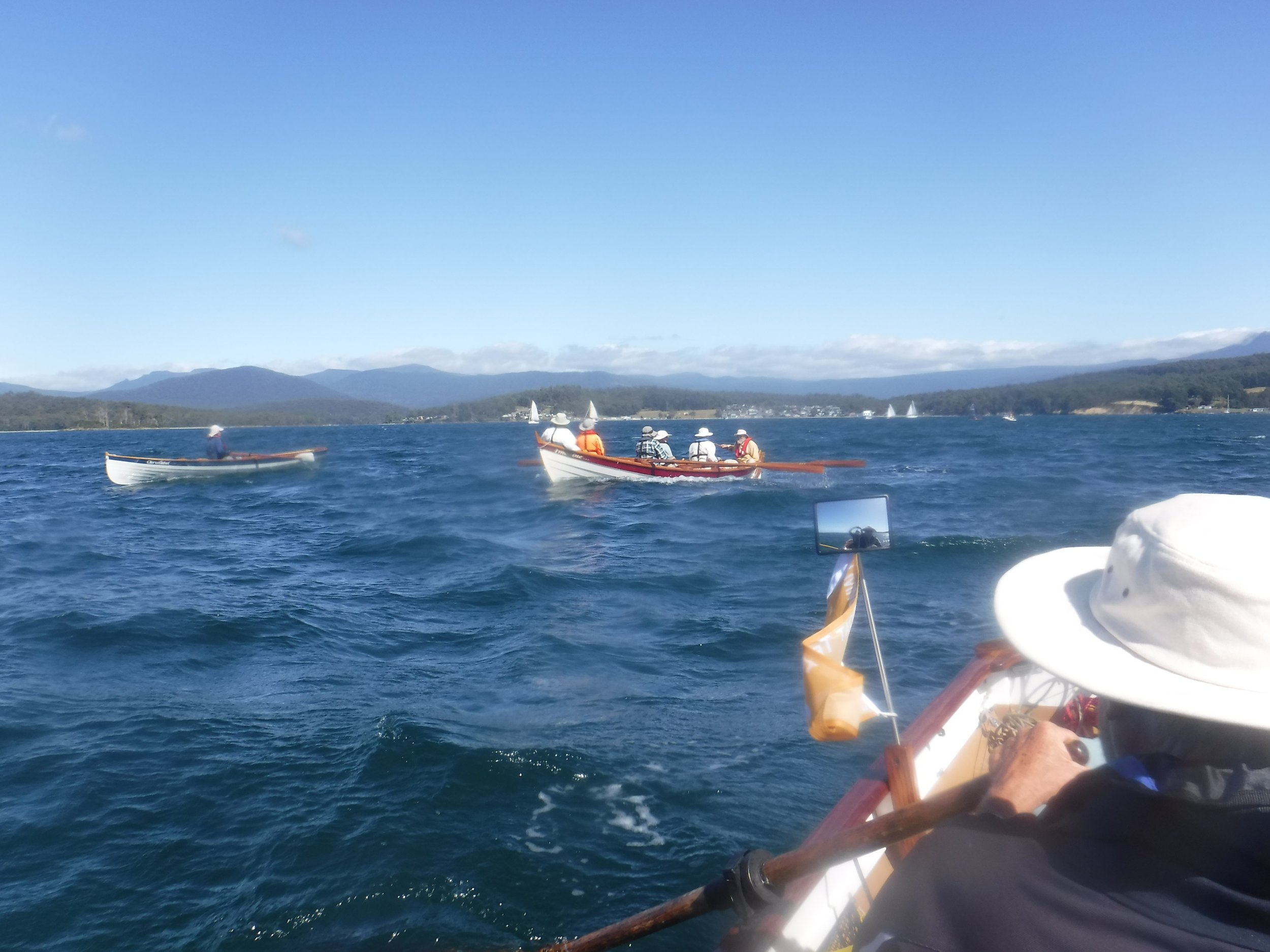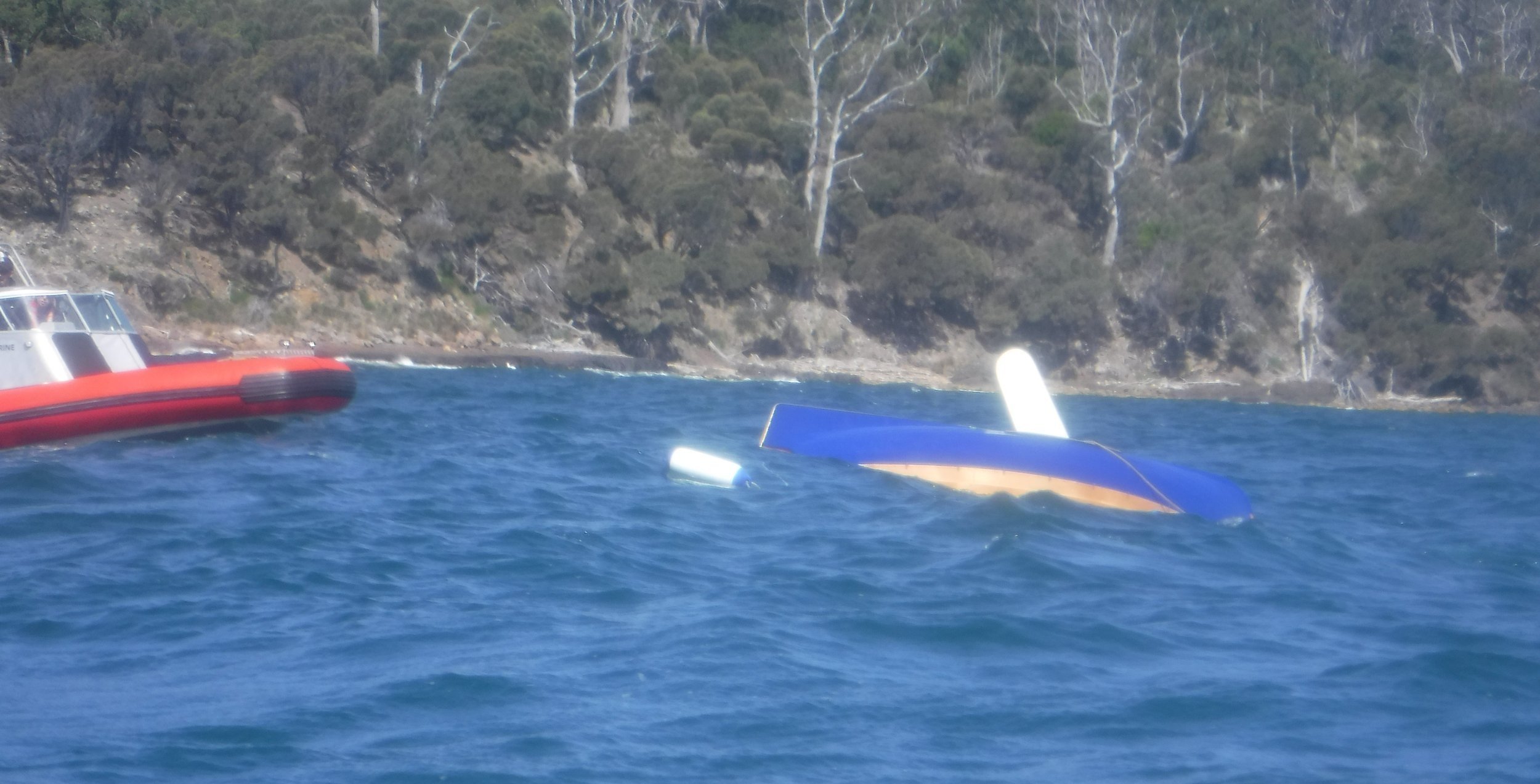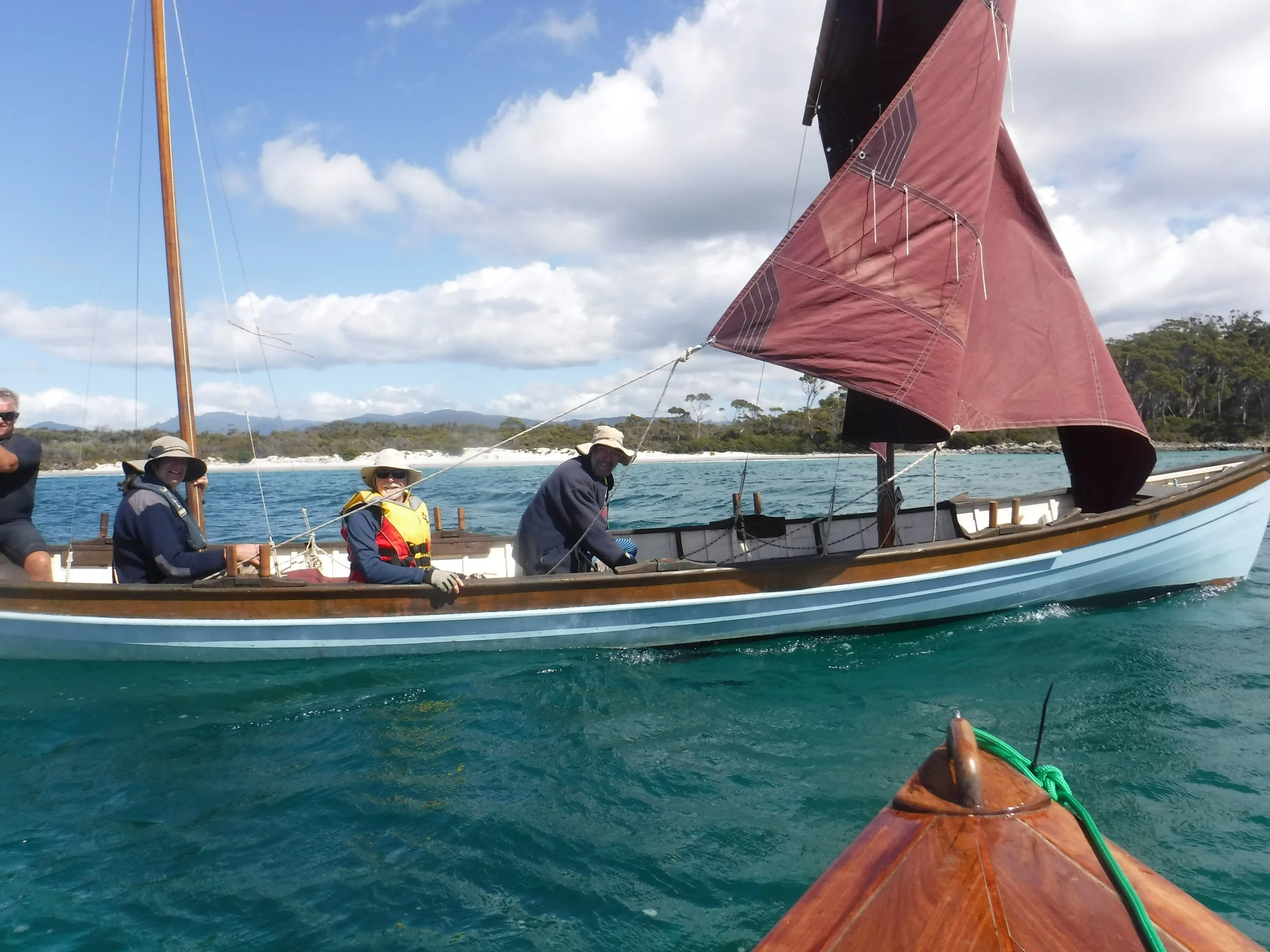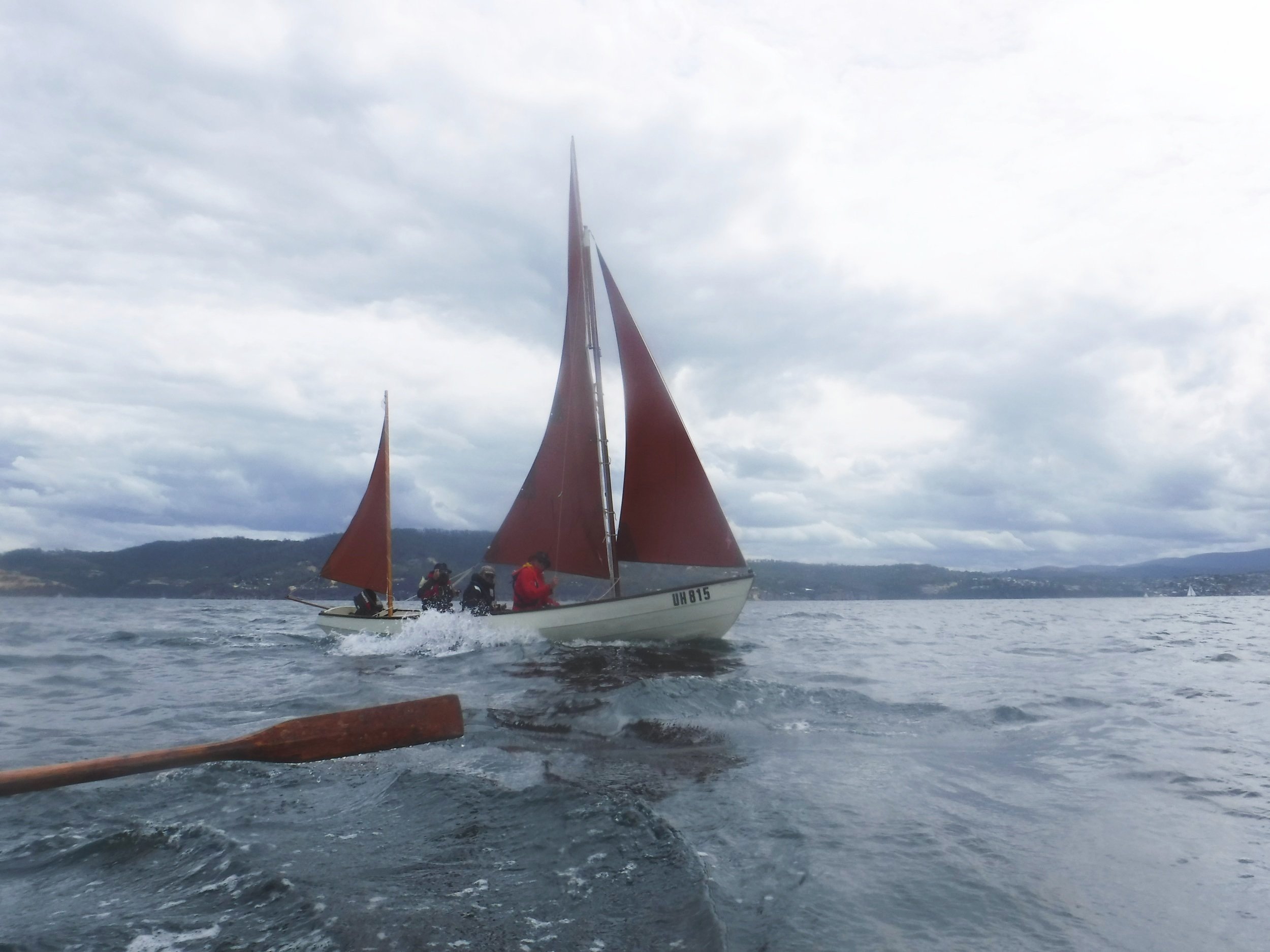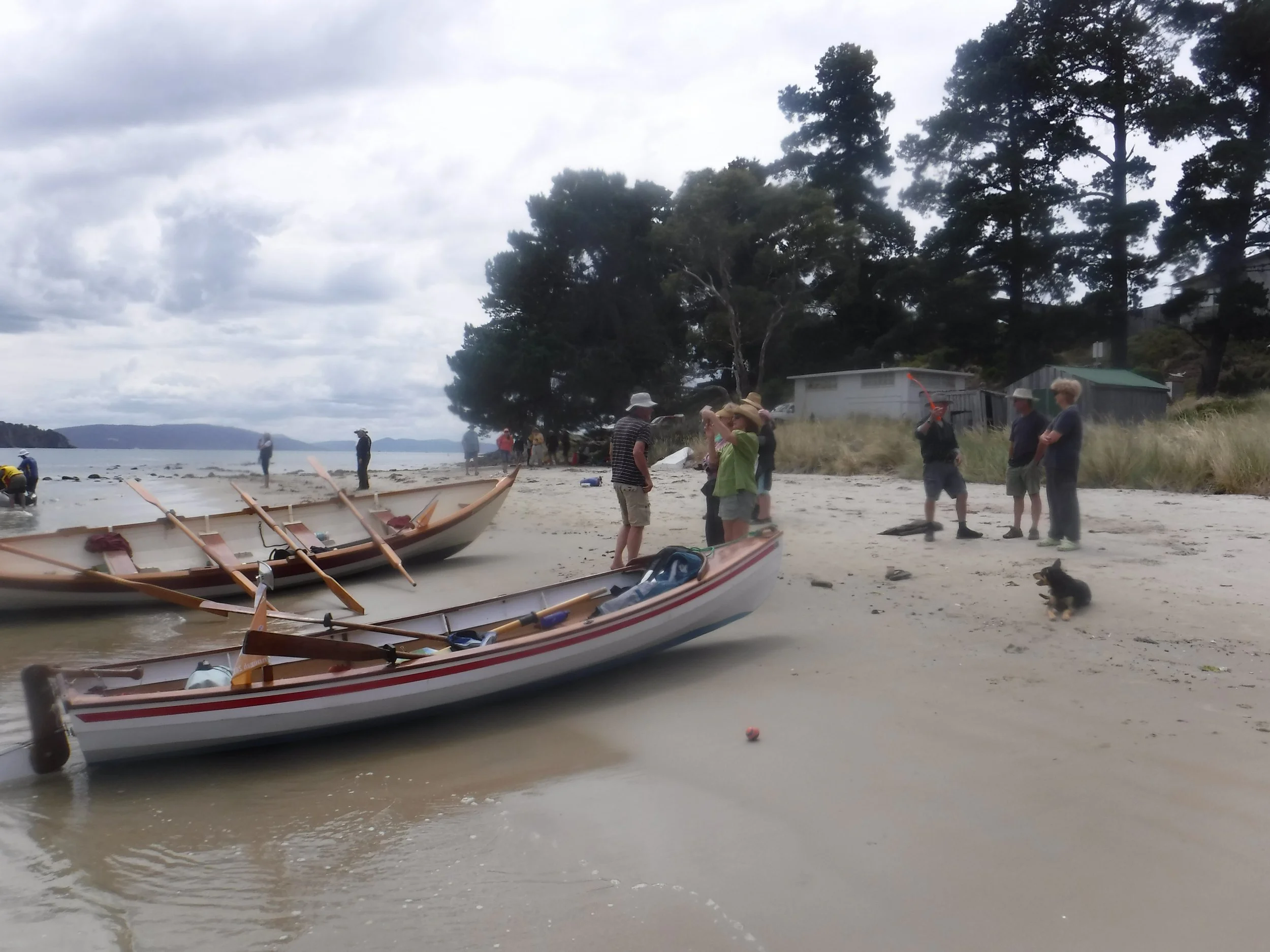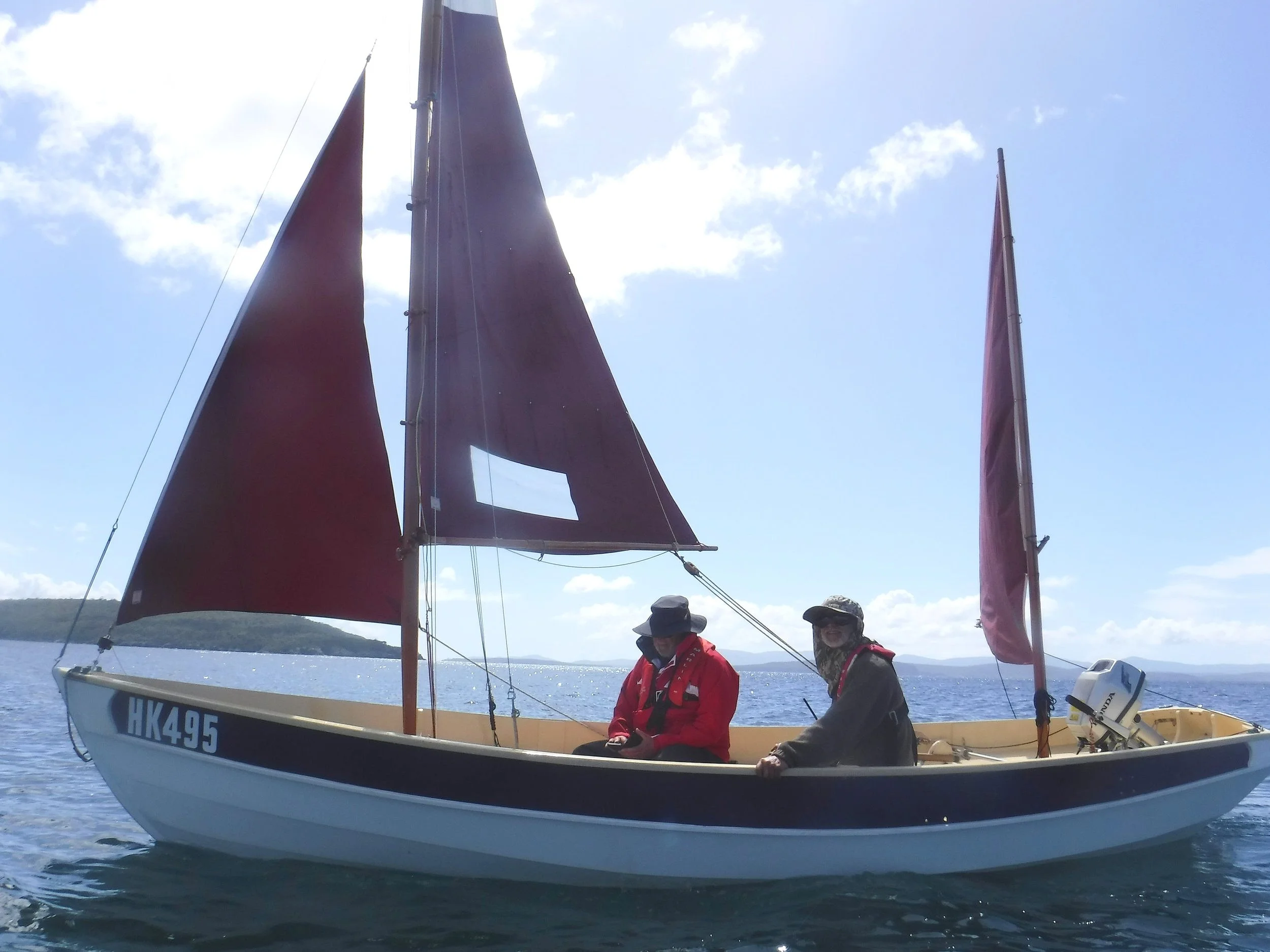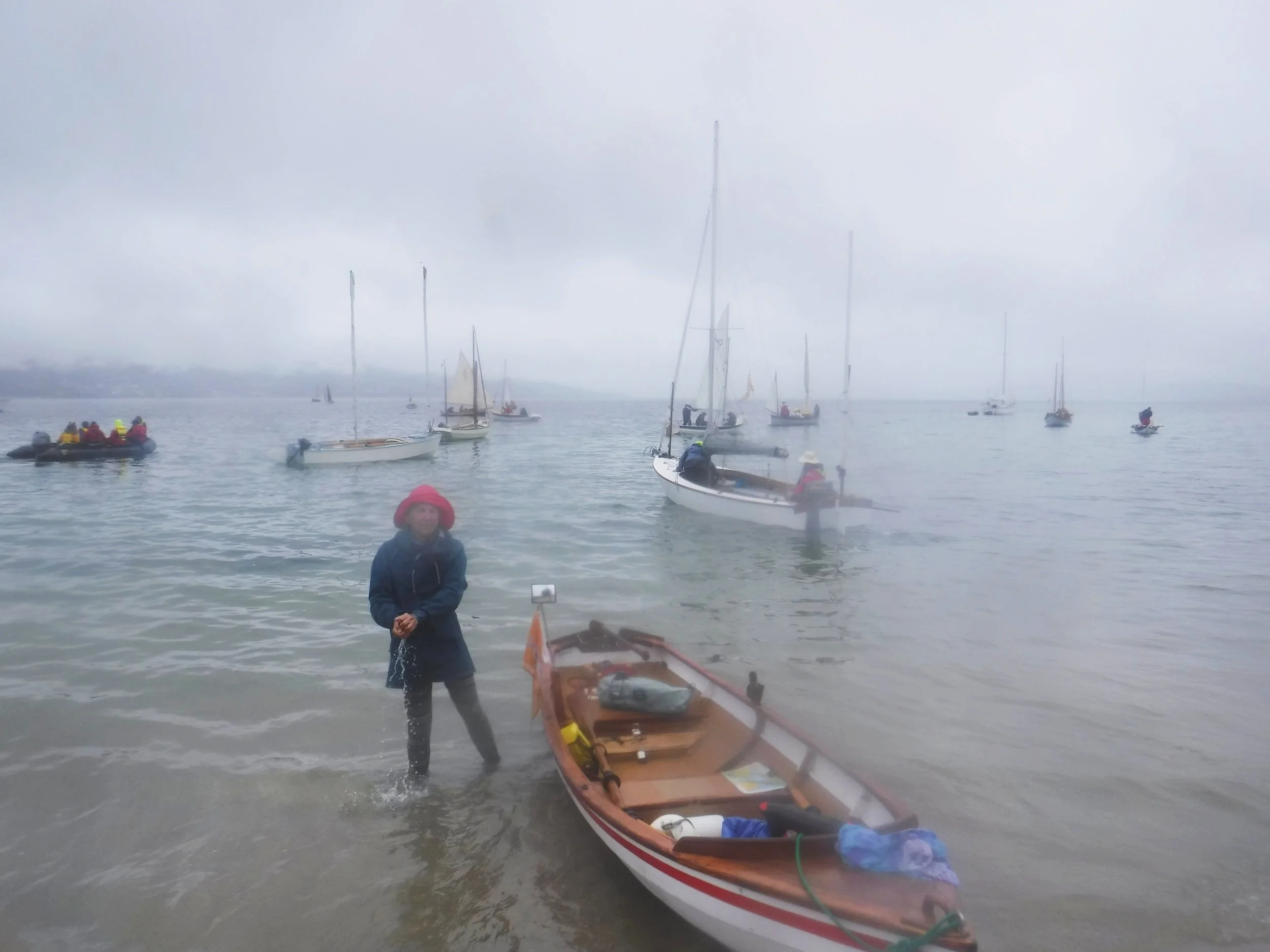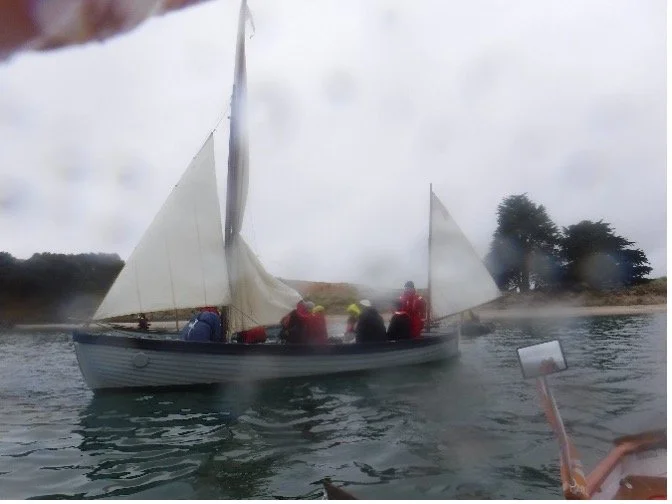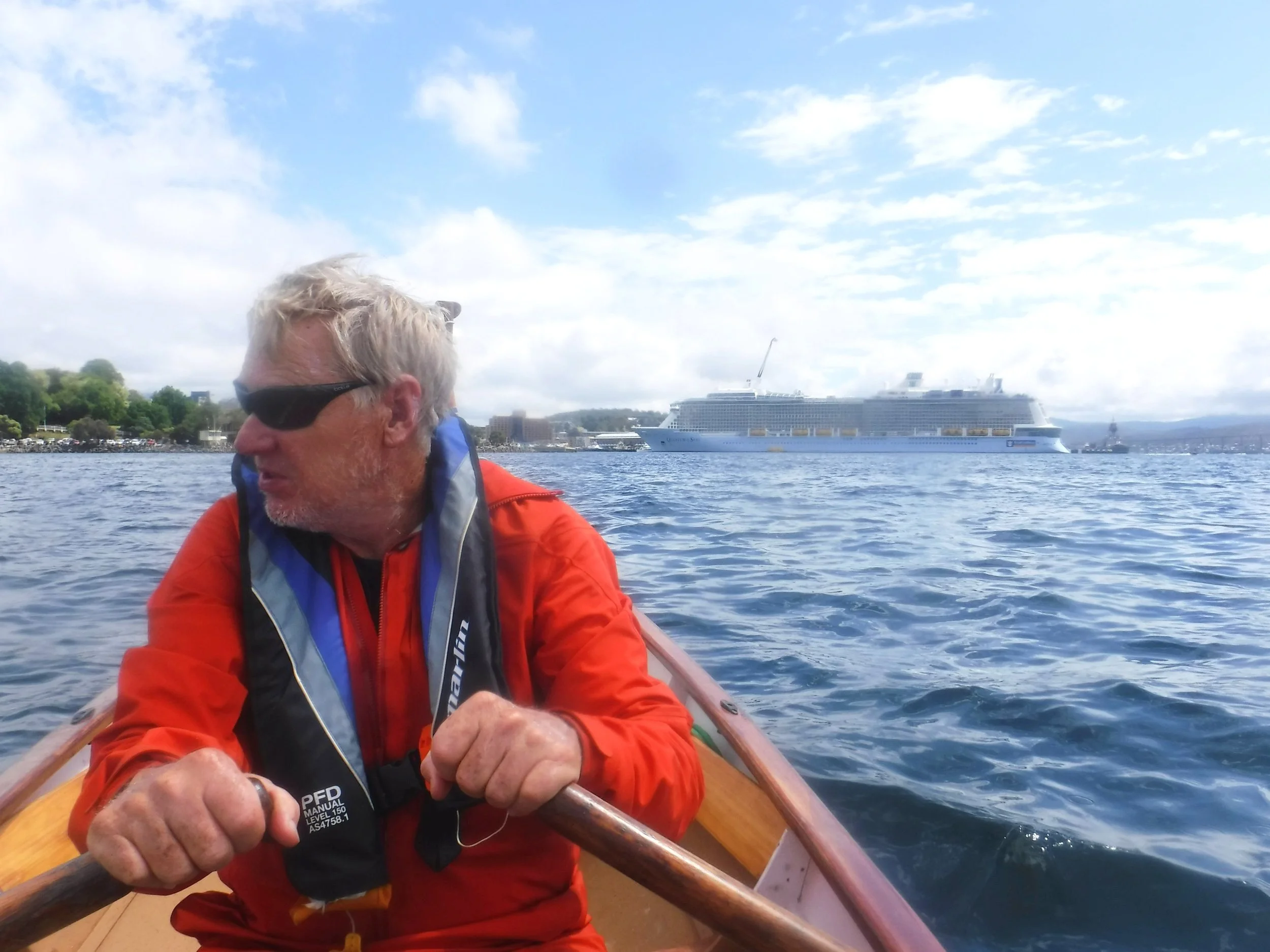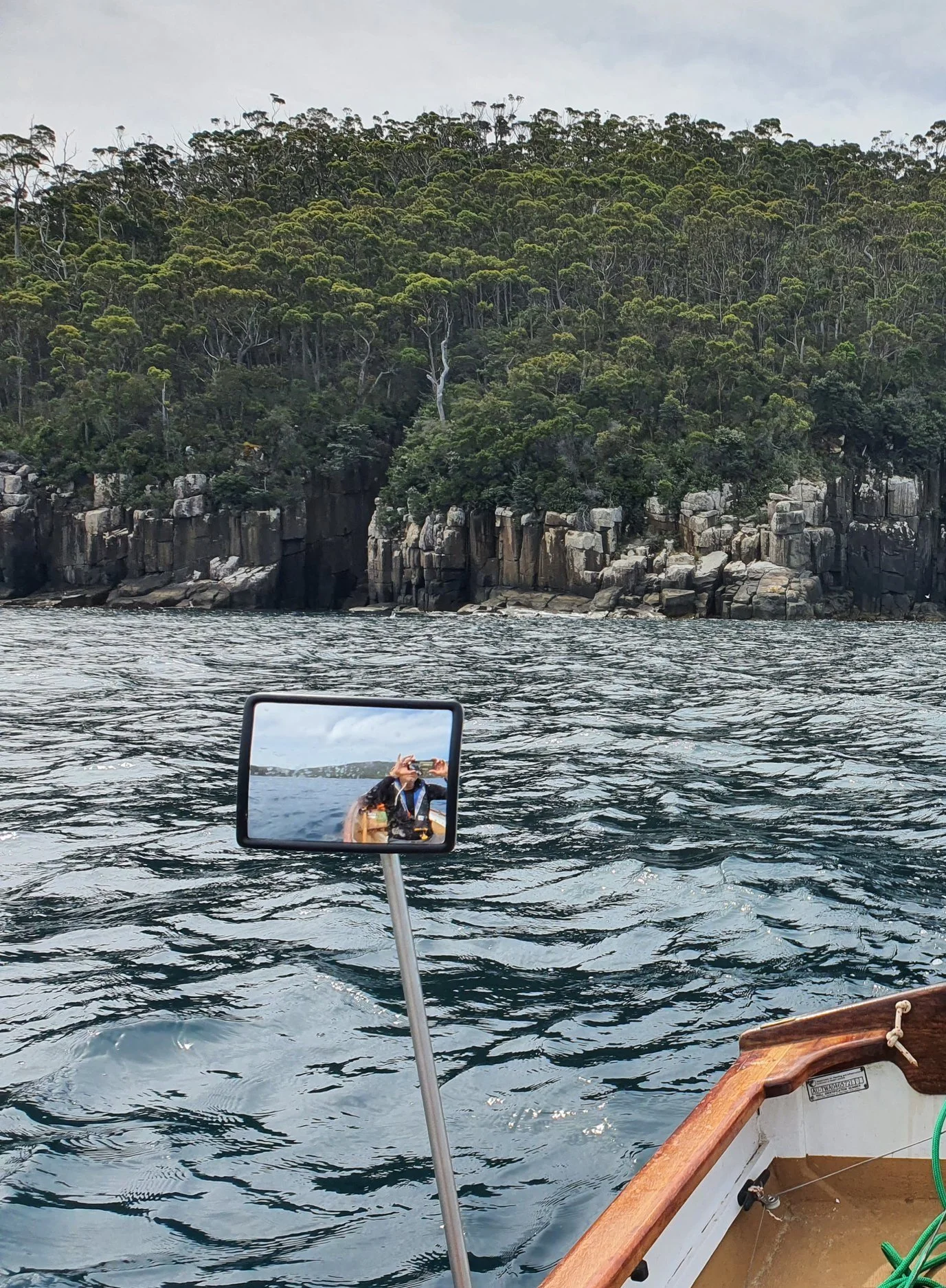Remember where you have been, look to where you are going.
The Raid- by Martin Chambers
It was not as though I needed another boat, but early in 2022 I was diagnosed with prostate cancer that had invaded a couple of lymph nodes so I bought a small rowing skiff and towed it across Australia to be a part of tawe nunnugah 2023. There is nothing like a cancer scare to settle your priorities.
Tawe nunnugah (TN23) is the Tasmanian Raid – a Raid being group voyaging in small boats, usually rowing or sailing and over several days. This particular raid was 10 days timed to finish in Hobart for the Australian Wooden Boat Festival where our 30 or so small craft would be on display, moored alongside hundreds of larger and more spectacular vessels.
TN 23 is organised by the Living Boat Trust who are based in Franklin on the banks of the Huon River. You can join the raid by simply signing on as crew on one of the LBT whaleboats or St Isles Skiffs, or you can come as a privateer and bring your own craft. And so in the days leading up to the start the foreshore at Franklin became a hive as people began arriving with their trailered vessels. Rowing skiffs, longboats, day sailers for single, double or a crew of three, a couta boat with a crew of seven, a trimaran sailing kayak and a Warram cat. Wood, hemp, and varnish predominated.
The gathering fleet. Grace and Little Ripple
Setting Swiftsure on trailer for ride to Catamaran
Due to Covid this was the first raid for four years, resulting in record entries. There would be at least a hundred people on the water. To keep us safe we had a mothership, several accompanying yachts, and four fast safety boats. Volunteers would meet us each evening with the equipment trucks, including a monster marquee and tables and chairs so we could all dine in comfort. In truth, on the raid everyone is also a volunteer so usually after a long day of rowing I’d find myself unloading a truck or assembling tables. About the only task we were not allowed was cooking. My key to great camp cooking is simple. Two things. Extreme hunger and total darkness. On this camp we ate in daylight to magnificent views and we were never hungry. In charge was Kate who calls herself a chef but is actually a magician. She and her team of volunteers fed us extremely well.
Camp at Moss Glen
Dinnertime at Simpsons Point
Day one we shifted our boats to Catamaran, launched them at the most southerly boatramp in Australia, then somehow got all the cars and trailers back to Franklin. A short sail to Moss Glen and then a smoking ceremony to welcome us. Danny Gardiner and his son Manala lit a small fire, told us a little of the area and our need to join in the care of the land. Manala then invited the front row to circle the fire, into and out of the smoke, but such was the mood that one by one everyone stood and silently walked the circle.
Mooring at Moss Glen. Tosh on beach. Fala behind
Danny tends the reluctant fire. Picture by Ben Healy
Beyond the fire smoke we could see the boats at anchor, and then we saw Martin Riddle on his boat, Hop the Wag, sail in. As Martin was the Raid organiser Danny insisted we wait and smoke him a welcome. He arrived still wearing his lifejacket and wet trousered from having had to wade ashore, and with the fire nearly out Manala blew and blew at it while Martin waited patiently and somewhat bedraggled. It had no doubt been a hectic day for him. Danny repeated his welcome. It was beautiful comedy, and touchingly genuine.
Day two was a shakedown cruise from Moss Glen to Cockle Creek for lunch, then a return to Moss Glen. After lunch a northerly wind came up, a headwind, bane of rowboats. We departed before the fleet and watched as one by one the yachts sailed past. Only one boat sank. The good news was the rescue boats did what they had to do and radio communications worked perfectly. We were ready to raid!
RowBob on beach at Cockle Creek
Tosh, before the wind died in the afternoon
Day Three was Moss Glen to Southport, about 20km. After breakfast and briefing it took more than an hour to pack down the camp. Everyone helped but our enthusiasm was our downfall, because unless loaded in exactly the right order everything would not fit into the two trucks. Two tons of personal gear, one hundred and thirty chairs, twenty tables, the marquee.
The morning briefing also included a weather forecast from Kevin. Today he had arranged a 2m swell and winds building from the WNW. Kevin claimed he was simply the messenger but we all knew better than that. He had dialled in an almost perfect set of conditions. Rowing to light winds with a rolling 2m swell pushing us along, the backwards view from a rowboat was the southern ocean, swell breaking onto Actaeon Islands and George Third Rocks. We are south of the south end of Bruny, perched on the end of the world. We snuck inside Southport Island while most of the yachts took the long way around. Imagine landed for lunch on a surf beach but we ate while drifting, content to let the boat be itself, and after lunch we managed to hold them off. Who says it is not a race?
Drifting lunchtime snooze
Kevin the weatherman. This Photo from exhibition at the Wooden Boat Festival, “Custodians” by Andrew Wilson
Day four: Overnight the wind built and rain set in. At the morning briefing there was no discontent when a lay day was announced. We spent the day chill in the tent. Others walked the town, discovered the pub, played the TN23 pool championships. Kate announced fish and chips for dinner, direct from the pub. The Living Boat Trust is a community organisation that supports local businesses.
Day five. Southport to Dover, 22km. Overcast morning and we are beginning to work better together. The trucks are loaded with a bit less fuss, everything in its place and a human chain missing only the chanting. At the briefing Kevin gives us a 2m swell and similar conditions to yesterday. Some rain. In the rowboats we are not fussed about rain, only headwinds. We departed early and had a great run along the coast. Robert joined us for the day, in his Acorn 16, Christobel, rowing solo he was an impressive sight as lumpy seas and swell lifted him to view, then hid him against a backdrop of cliffs. The Acorn is faster than RowBob so he and Imagine, the St Iles Skiff, slowly pulled away. The yachts had headed further out in search of wind and we were alone with the sky and seabirds and the rolling waves. Perfect.
Again, by the time we rowed into Dover the wind had built and nearly everyone else was home.
Who says it is not a race? Imagine and Christobel
Big fun in the waves
Day six. Dover to Simpsons Point on Bruny Island, 32km. Big swell. Big wind. A big day. In RowBob we had immense fun, surfing down 2m wave faces, barely a drop into the boat. We never felt the slightest concern but one of the rescue boats was obviously worried. They stayed close all day although they needn’t have bothered -those RIB’s are safe, very stable and have a big powerful motors. Score for the day was one capsize, one lost shoe and a drowned phone.
This is not an incident. A capsize is to be expected
World Bay Raider champions
Day seven. Another lay day, not for inclement weather but to give both the raiders and the volunteers some rest. On the expedition there were three Bay Raider boats, so at short notice a course was set and crews nominated and a random draw saw hotly contested heats. The wind was gusty, the start heavily favoured the port end, the pin end was in close under the steep shore so even more fluky, but spectators got a great view. The winners were, apparently, Wetsuit Dave, Flip Nutting and Jenny Cavill, sailing Little Ripple. The rumour spread that the inaugural Australian Bay Raider championships was in fact the inaugural world championships. The boys on Boxer conjured up an appropriate trophy and oyster shell medallions.
Capricornia, one of the Living Boat Trust whaleboats
Fairwind, a Drascombe longboat
Others spent the day trying out others’ boats, or sailing to visit the lookout on Bruny Island, or walking to the high hill behind the camp to get a view of D’Entrecasteaux Channel.
Day eight. Simpsons Point to Quarantine Bay, 24km. A gentle day. Kevin excelled in presenting us a tailwind and a day not too hot and not too cold. We rowed in close to Green Island and the seal colony, a cormorant rookery, then lunched ashore on Snake Island with Gavin (on Tosh) and Garry (on Derry). Snake Island was the inspiration for a children’s book (Those Snake Island Kids, by Jon Tucker) and I could not help dreaming of Swallows and Amazons. How, we spend our lives trying to recapture magic moments from our youth, and here it was.
Lunch at Snake Island. Picture thanks to Steph van den Hoek
A Swallows and Amazons adventure
After lunch we continued to Quarantine Bay, site of the quarantine station where servicemen were interred when they returned from the first war due to the Spanish flu pandemic. It seemed somehow odd given that the 2021 Raid was cancelled due to Coronavirus.
The wind dropped out, we rowed close to cliffs on millpond still water. Yachts became becalmed and we savoured one rare mid fleet finish.
Day nine: Quarantine Bay to South Arm 34km. With a wind forecast to build from the East we were away early. RowBob and Imagine relished the early calm and arrived at Dennes Point to be greeted by members of the Dennes Point Progress Association who had tea, coffee, fresh jam and cream scones. I hope Dennes Point never suffers progress.
Hungry rowers eating all the scones before the yachts arrive
Jim and Chris, sailing Lugger
It was a long slow row across the mouth of the Derwent. The Iron Pot stood guard, as it does, resolutely refusing to move aft. The wind rose, only 10 to 12 knots but there was enough fetch to create a slop. RowBob slowed. The front engine faltered. As a rower Kerryn is more Fiat twostroke than Gardiner diesel. One by one the sailing boats went by. When they came close we sang, to lift our spirits or to spur them on? Well, our singing is not that good.
Late into camp and full of the tiredness that refreshes, this camp made up for a long day at the oars. A perfect little bay, a perfect little beach, all the boats anchored as one and an almost flat grassy tent site. No need for the marquee we dined under the stars. I fell to happy sleep.
Anchorage at south arm. Rain fails to dampen our mood
Monty, one of the last of the Montagu whaleboats.
Day ten: South Arm to Hobart and the parade of sail, 10km. Night rain failed to damp our spirits. As a well-oiled machine we loaded the trucks. Kevin issued us no wind and a high UV. In RowBob we sang, we rowed, we glided by becalmed yachts. Those with motors dropped sails. Close to Hobart the tall ships, the wooden boats, the highly polished launches were heading out to the parade of sail and as we rowed on they waved and shouted their encouragement. As we rounded into Sullivans Cove the sight behind us was of several hundred boats bearing down on us. In particular the tall ships like some invading armada. People cheered us but we didn’t deserve it. We had just had the best ever ten days.
And the crowds cheered us on
The fleet on display at Watermans Dock
Perhaps rowing is a metaphor. As we age we seem to spend more time looking back than looking forward, and we risk stagnation. If we don’t row we go nowhere. It is important to know where we have been, but more so to know where we want to go. We had arrived at our destination, the Australian Wooden Boat festival, but the Festival, and TN23, it is not about the boats or the shine of varnished wood, the polished brass or the sharp set of sails. It is no material thing. It is people, several thousand in one place celebrating what they love. It is a community.
So, look in your foreview mirror. Men, go get your PSA measured. I’ve been lucky. Two months of radiation and I have been lucky. Hormone injections, blood tests, and I have been lucky. Men, go get your PSA measured. I will see you at the next raid.
Remember where you have been, look to where you are going.
Martin’s book “Sailing the Seven Sustainable Seas” is available
in print, as an eBook, and now as an Audiobook (available on Spotify)

